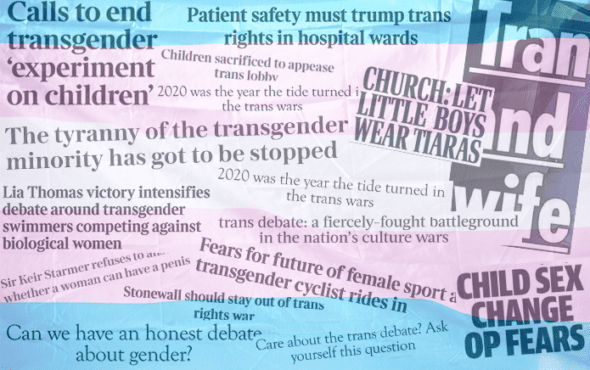
The vast majority of the LGBTQ+ community believe framing the discussion of transgender rights as a ‘debate’ is harmful, a GAY TIMES survey has found.
The findings come as the UK media puts topics like self-identification and using the spaces that align with someone’s gender identity in the spotlight, despite trans and non-binary people being estimated to make up just 1 per cent of the population in Britain.
This is often framed as the so-called ‘trans debate’, which frequently sees human rights issues tossed around as if they are a trivial matter and are used to fuel a wider anti-trans agenda.
On 29 March, two days before Trans Day of Visibility, talkRADIO ran Twitter polls asking if a woman can have a penis and whether or not a man can get pregnant.
“Equalities watchdog launches study aiming to ‘reduce distress’ in trans debate,” wrote The Telegraph a week earlier, referencing alleged “fears” that trans activists are “harming freedom of expression” and abusing feminist academics.
Four years earlier, the same outlet ran a thinkpiece titled: “The tyranny of the transgender minority has got to be stopped.”
“Stonewall should stay out of trans rights war,” read another headline on 22 May 2022, this time in The Times.
The list of examples could go on, as a quick Google search of “trans debate” returns 330,000,000 results.
Despite how frequent this characterisation is becoming, GAY TIMES’ survey has revealed that framing the discussion in this way is not welcomed by the LGBTQ+ community.
Of the 996 respondents, more than three quarters (77.5 per cent) have seen trans rights described as a ‘debate’ in the UK media.
96.4 per cent said they believe this framing to be harmful, a figure which rises to 96.6 per cent when looking solely at LGBTQ+ people who took the survey.
When it comes to our human rights, there should be no debate.
— Mermaids (@Mermaids_Gender) January 27, 2022
“We know how detrimental anti-trans rhetoric in the media is, particularly when framed as a ‘hot topic’ for ‘debate’,” said Bex Shorunke, the PR & Media Engagement Manager at trans charity Mermaids. “Since when did a human being’s fundamental rights, and access to spaces, become something up for discussion?”
There are also serious concerns in the way trans issues are portrayed by the UK media, with just 0.9 per cent of respondents believing it to be a ‘completely accurate’ depiction and 6.2 per cent viewing it as ‘somewhat accurate’.
Almost 9 in 10 (86.4 per cent) believe trans issues are ‘somewhat’ or ‘completely’ inaccurately reported on, and just 6.5 per cent believe it to be ‘fair’.
Peter Tatchell, one of the UK’s most prominent human rights campaigners, said the GAY TIMES “survey result is a damning indictment of transphobia in much of the UK media.”
“Trans voices are routinely ignored, demonised and ridiculed,” he continued. “In contrast, inflammatory, inaccurate and bigoted anti-trans views are given ceaseless coverage. Most journalists would never dare publicise similar abusive opinions about disabled, Black or LGBTQ+ people, but many seem to think that trans people are fair game.”
Only 2.8 per cent of respondents said they ‘never’ see transphobic reporting in the UK media, a stark contrast to the 44.9 per cent who see it ‘often’ and the 27.3 per cent who see it ‘sometimes’.
All women, including trans women, are victims of misogyny, domestic violence, harassment, discrimination rape & hate crime. This gives them a common interest in working together to protect the rights of all women, including those who are trans. Unity & solidarity! pic.twitter.com/m0Wfx43imc
— Peter Tatchell (@PeterTatchell) November 14, 2021
A further 14.9 per cent stated that they see it ‘all the time’, with just 1 in 10 (10 per cent) ‘very rarely’ encountering it.
“The press watchdog has failed completely to uphold fair, impartial reporting,” Tatchell added. “It is unfit for purpose and should be disbanded.”
A lot of the UK’s print media is regulated by the Independent Press Standards Organisation (IPSO) in order to hold outlets to account and ensure high standards are being met.
GAY TIMES contacted IPSO to ask if there were any plans to update its guidelines on trans reporting, particularly when it comes to the depiction of these issues as a ‘culture war’ that is up for debate.
“IPSO periodically updates all its guidance and plans to refresh its guidance on the reporting of transgender issues towards the end of this year,” a spokesperson stated.
“As with all IPSO guidance, it is designed to explain how the Editors’ Code applies to the reporting of particular topics. It aims to support editors and journalists to uphold high editorial standards, but does not supersede or replace the Editors’ Code itself.”
Trans Media Watch is an organisation that exists to help the media report on trans issues with accuracy, dignity and respect.
jane fae, Chair of Trans Media Watch, who stylises her name in lowercase, told GAY TIMES that the findings “are disappointing but not at all surprising.”
“One constant in our work representing trans people to the UK media is the enormous toll that this sort of constant transphobic presence in the press is wreaking on the trans community,” fae stated.
She further explained that this reporting often worsens the mental health of trans people and makes them “more likely to hide at home and not go out”.
“For their part, the UK press and media are utterly shameless,” jane continued. “They twist. They sensationalise. They are more than happy to lead with stories that are simply untrue, even where these stories can have significant negative consequences for trans people.”
Trans Day of Visibility takes place on 31 March in order to celebrate the trans community and raise awareness of the discrimination they continue to face.
GAY TIMES stands in solidarity with the trans+ community and we’d like to make clear to our readers that the lives, experiences and rights of trans people are not up for debate.
GAY TIMES ran its survey for 24 hours from the morning of 15 March through to the following day, with a total of 996 respondents having their say.
Mermaids provides a range of helpline and webchat services supporting transgender youth. We also support families and professionals. For more on our helpline services, visit https://t.co/J1yCimPw55 pic.twitter.com/8G35wTpgKc
— Mermaids (@Mermaids_Gender) March 28, 2022



